A Deep Dive into Apple Inc.'s Business Ethics and Corporate Governance
VerifiedAdded on 2023/01/12
|11
|3157
|37
Report
AI Summary
This report provides a comprehensive analysis of Apple Inc.'s business ethics and corporate governance, focusing on the controversy surrounding the intentional slowing down of older iPhone models. The report begins with an introduction to corporate governance and its importance in ethical business conduct, followed by a case study of Apple's actions. It examines the ethical issues involved, the company's response, and the application of normative and descriptive theories of business ethics, including deontology. The report also evaluates the impact of Apple's ethical and unethical practices on its stakeholders, considering their perspectives. Finally, the report explores corporate governance measures taken by Apple to address the ethical misconduct. This analysis provides valuable insights into the complexities of business ethics and corporate responsibility, offering a detailed examination of the case and its implications.
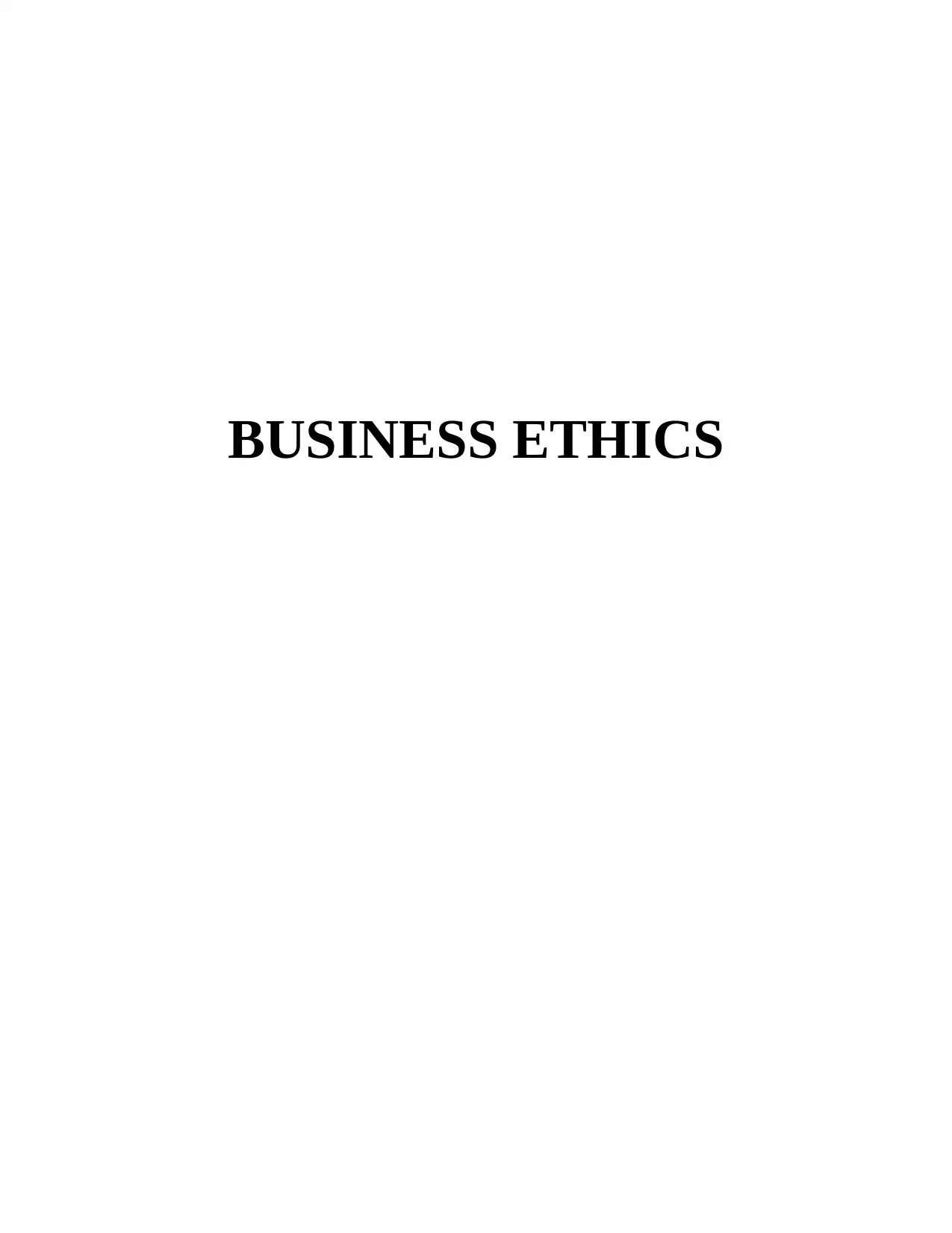
BUSINESS ETHICS
Paraphrase This Document
Need a fresh take? Get an instant paraphrase of this document with our AI Paraphraser
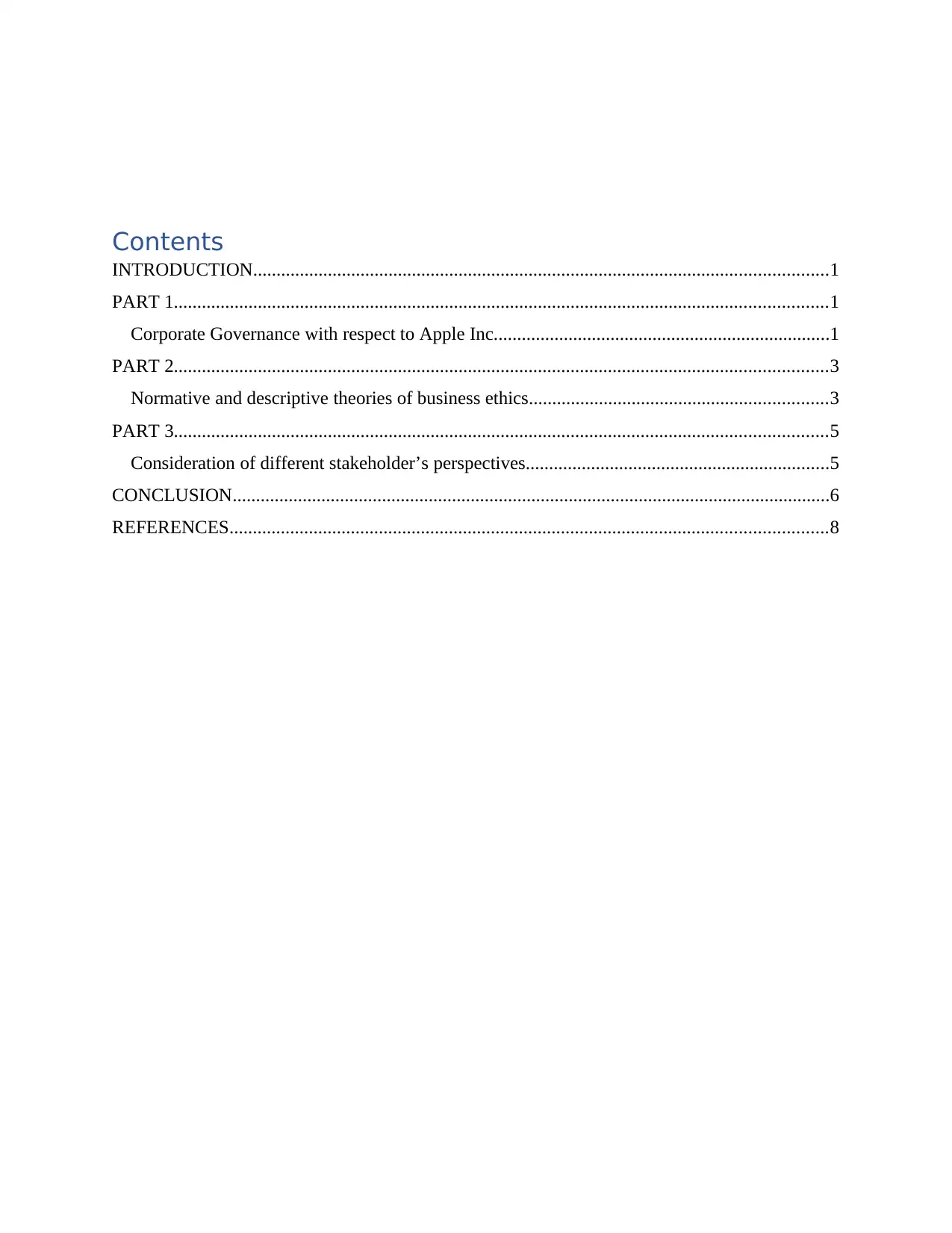
Contents
INTRODUCTION...........................................................................................................................1
PART 1............................................................................................................................................1
Corporate Governance with respect to Apple Inc........................................................................1
PART 2............................................................................................................................................3
Normative and descriptive theories of business ethics................................................................3
PART 3............................................................................................................................................5
Consideration of different stakeholder’s perspectives.................................................................5
CONCLUSION................................................................................................................................6
REFERENCES................................................................................................................................8
INTRODUCTION...........................................................................................................................1
PART 1............................................................................................................................................1
Corporate Governance with respect to Apple Inc........................................................................1
PART 2............................................................................................................................................3
Normative and descriptive theories of business ethics................................................................3
PART 3............................................................................................................................................5
Consideration of different stakeholder’s perspectives.................................................................5
CONCLUSION................................................................................................................................6
REFERENCES................................................................................................................................8

⊘ This is a preview!⊘
Do you want full access?
Subscribe today to unlock all pages.

Trusted by 1+ million students worldwide
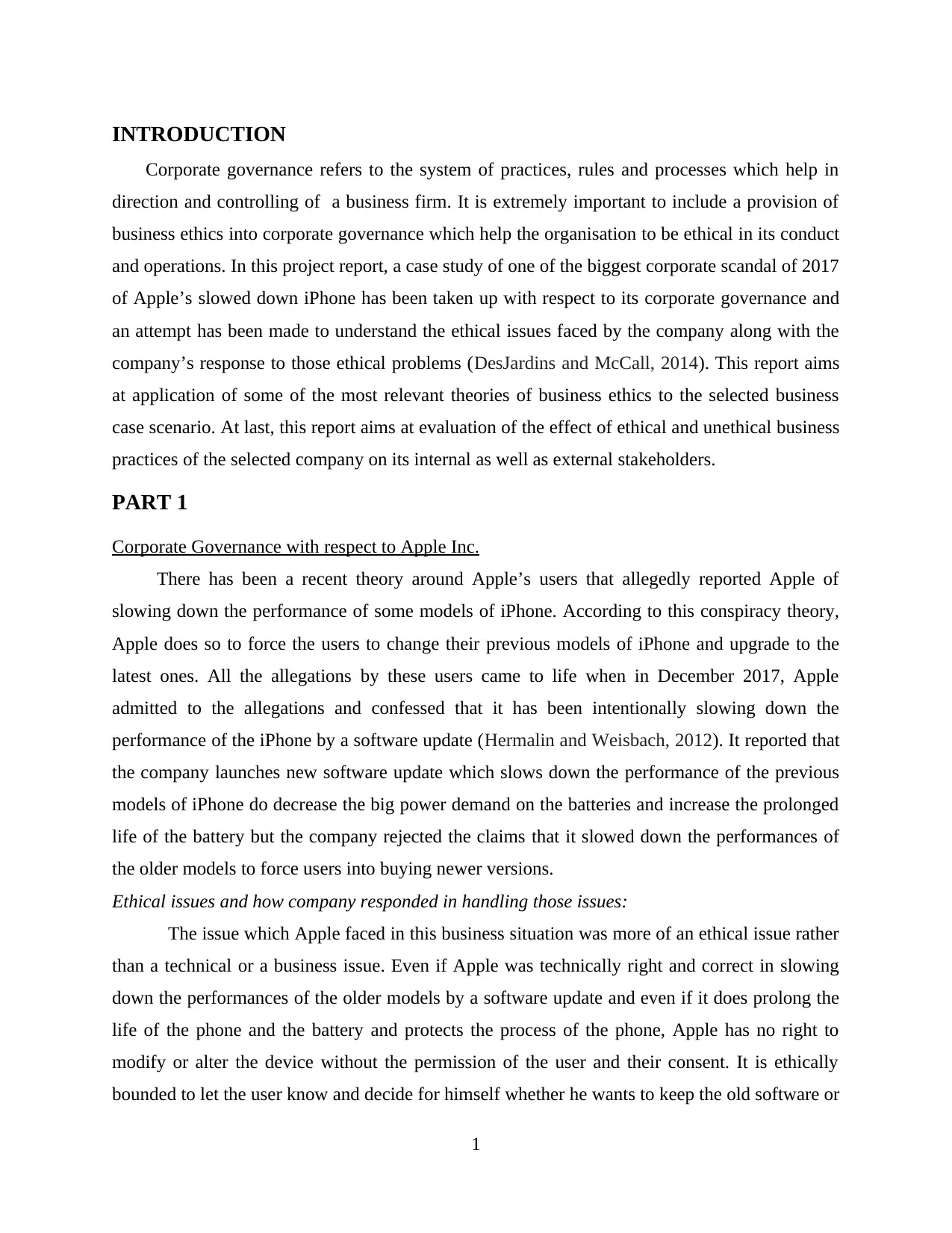
INTRODUCTION
Corporate governance refers to the system of practices, rules and processes which help in
direction and controlling of a business firm. It is extremely important to include a provision of
business ethics into corporate governance which help the organisation to be ethical in its conduct
and operations. In this project report, a case study of one of the biggest corporate scandal of 2017
of Apple’s slowed down iPhone has been taken up with respect to its corporate governance and
an attempt has been made to understand the ethical issues faced by the company along with the
company’s response to those ethical problems (DesJardins and McCall, 2014). This report aims
at application of some of the most relevant theories of business ethics to the selected business
case scenario. At last, this report aims at evaluation of the effect of ethical and unethical business
practices of the selected company on its internal as well as external stakeholders.
PART 1
Corporate Governance with respect to Apple Inc.
There has been a recent theory around Apple’s users that allegedly reported Apple of
slowing down the performance of some models of iPhone. According to this conspiracy theory,
Apple does so to force the users to change their previous models of iPhone and upgrade to the
latest ones. All the allegations by these users came to life when in December 2017, Apple
admitted to the allegations and confessed that it has been intentionally slowing down the
performance of the iPhone by a software update (Hermalin and Weisbach, 2012). It reported that
the company launches new software update which slows down the performance of the previous
models of iPhone do decrease the big power demand on the batteries and increase the prolonged
life of the battery but the company rejected the claims that it slowed down the performances of
the older models to force users into buying newer versions.
Ethical issues and how company responded in handling those issues:
The issue which Apple faced in this business situation was more of an ethical issue rather
than a technical or a business issue. Even if Apple was technically right and correct in slowing
down the performances of the older models by a software update and even if it does prolong the
life of the phone and the battery and protects the process of the phone, Apple has no right to
modify or alter the device without the permission of the user and their consent. It is ethically
bounded to let the user know and decide for himself whether he wants to keep the old software or
1
Corporate governance refers to the system of practices, rules and processes which help in
direction and controlling of a business firm. It is extremely important to include a provision of
business ethics into corporate governance which help the organisation to be ethical in its conduct
and operations. In this project report, a case study of one of the biggest corporate scandal of 2017
of Apple’s slowed down iPhone has been taken up with respect to its corporate governance and
an attempt has been made to understand the ethical issues faced by the company along with the
company’s response to those ethical problems (DesJardins and McCall, 2014). This report aims
at application of some of the most relevant theories of business ethics to the selected business
case scenario. At last, this report aims at evaluation of the effect of ethical and unethical business
practices of the selected company on its internal as well as external stakeholders.
PART 1
Corporate Governance with respect to Apple Inc.
There has been a recent theory around Apple’s users that allegedly reported Apple of
slowing down the performance of some models of iPhone. According to this conspiracy theory,
Apple does so to force the users to change their previous models of iPhone and upgrade to the
latest ones. All the allegations by these users came to life when in December 2017, Apple
admitted to the allegations and confessed that it has been intentionally slowing down the
performance of the iPhone by a software update (Hermalin and Weisbach, 2012). It reported that
the company launches new software update which slows down the performance of the previous
models of iPhone do decrease the big power demand on the batteries and increase the prolonged
life of the battery but the company rejected the claims that it slowed down the performances of
the older models to force users into buying newer versions.
Ethical issues and how company responded in handling those issues:
The issue which Apple faced in this business situation was more of an ethical issue rather
than a technical or a business issue. Even if Apple was technically right and correct in slowing
down the performances of the older models by a software update and even if it does prolong the
life of the phone and the battery and protects the process of the phone, Apple has no right to
modify or alter the device without the permission of the user and their consent. It is ethically
bounded to let the user know and decide for himself whether he wants to keep the old software or
1
Paraphrase This Document
Need a fresh take? Get an instant paraphrase of this document with our AI Paraphraser
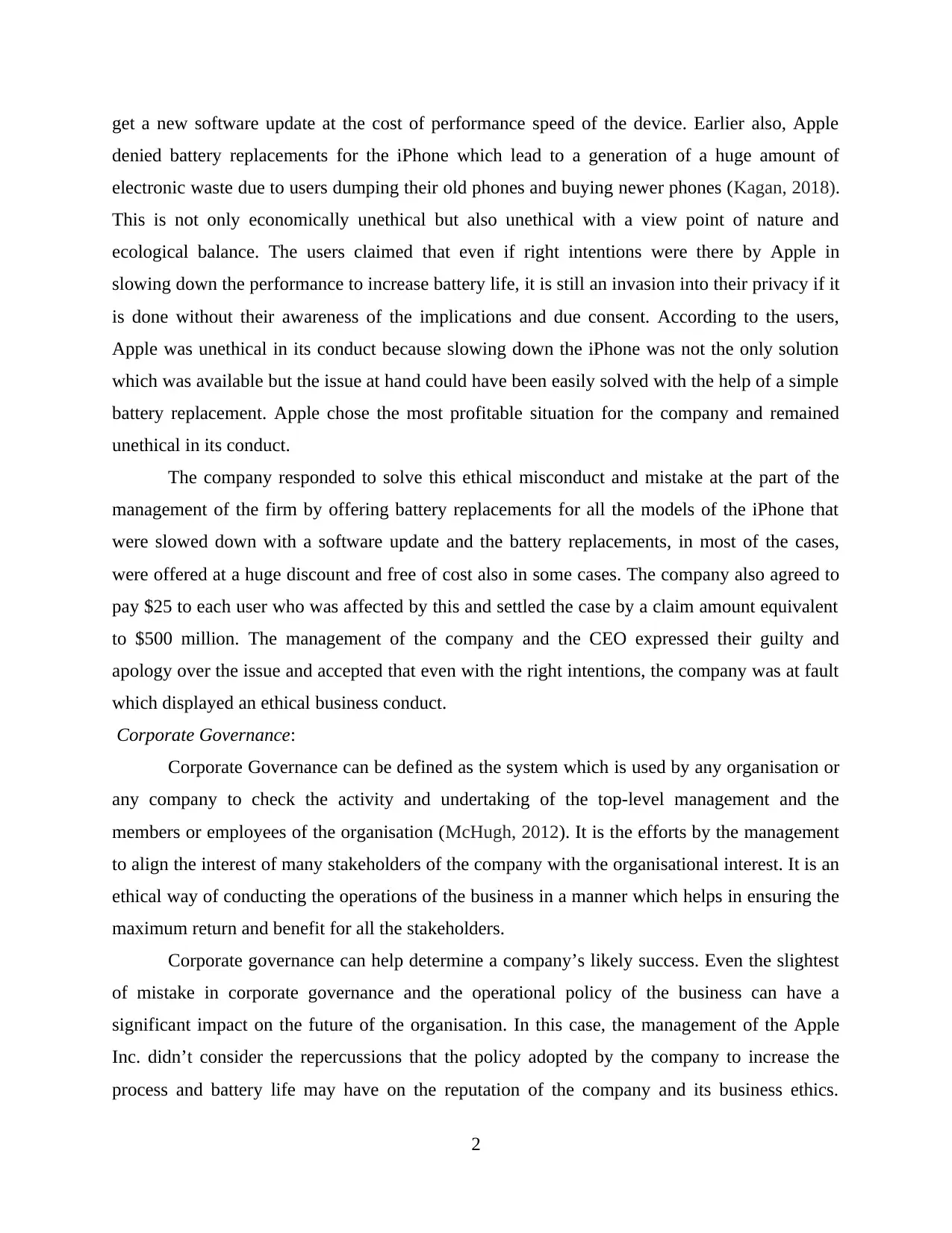
get a new software update at the cost of performance speed of the device. Earlier also, Apple
denied battery replacements for the iPhone which lead to a generation of a huge amount of
electronic waste due to users dumping their old phones and buying newer phones (Kagan, 2018).
This is not only economically unethical but also unethical with a view point of nature and
ecological balance. The users claimed that even if right intentions were there by Apple in
slowing down the performance to increase battery life, it is still an invasion into their privacy if it
is done without their awareness of the implications and due consent. According to the users,
Apple was unethical in its conduct because slowing down the iPhone was not the only solution
which was available but the issue at hand could have been easily solved with the help of a simple
battery replacement. Apple chose the most profitable situation for the company and remained
unethical in its conduct.
The company responded to solve this ethical misconduct and mistake at the part of the
management of the firm by offering battery replacements for all the models of the iPhone that
were slowed down with a software update and the battery replacements, in most of the cases,
were offered at a huge discount and free of cost also in some cases. The company also agreed to
pay $25 to each user who was affected by this and settled the case by a claim amount equivalent
to $500 million. The management of the company and the CEO expressed their guilty and
apology over the issue and accepted that even with the right intentions, the company was at fault
which displayed an ethical business conduct.
Corporate Governance:
Corporate Governance can be defined as the system which is used by any organisation or
any company to check the activity and undertaking of the top-level management and the
members or employees of the organisation (McHugh, 2012). It is the efforts by the management
to align the interest of many stakeholders of the company with the organisational interest. It is an
ethical way of conducting the operations of the business in a manner which helps in ensuring the
maximum return and benefit for all the stakeholders.
Corporate governance can help determine a company’s likely success. Even the slightest
of mistake in corporate governance and the operational policy of the business can have a
significant impact on the future of the organisation. In this case, the management of the Apple
Inc. didn’t consider the repercussions that the policy adopted by the company to increase the
process and battery life may have on the reputation of the company and its business ethics.
2
denied battery replacements for the iPhone which lead to a generation of a huge amount of
electronic waste due to users dumping their old phones and buying newer phones (Kagan, 2018).
This is not only economically unethical but also unethical with a view point of nature and
ecological balance. The users claimed that even if right intentions were there by Apple in
slowing down the performance to increase battery life, it is still an invasion into their privacy if it
is done without their awareness of the implications and due consent. According to the users,
Apple was unethical in its conduct because slowing down the iPhone was not the only solution
which was available but the issue at hand could have been easily solved with the help of a simple
battery replacement. Apple chose the most profitable situation for the company and remained
unethical in its conduct.
The company responded to solve this ethical misconduct and mistake at the part of the
management of the firm by offering battery replacements for all the models of the iPhone that
were slowed down with a software update and the battery replacements, in most of the cases,
were offered at a huge discount and free of cost also in some cases. The company also agreed to
pay $25 to each user who was affected by this and settled the case by a claim amount equivalent
to $500 million. The management of the company and the CEO expressed their guilty and
apology over the issue and accepted that even with the right intentions, the company was at fault
which displayed an ethical business conduct.
Corporate Governance:
Corporate Governance can be defined as the system which is used by any organisation or
any company to check the activity and undertaking of the top-level management and the
members or employees of the organisation (McHugh, 2012). It is the efforts by the management
to align the interest of many stakeholders of the company with the organisational interest. It is an
ethical way of conducting the operations of the business in a manner which helps in ensuring the
maximum return and benefit for all the stakeholders.
Corporate governance can help determine a company’s likely success. Even the slightest
of mistake in corporate governance and the operational policy of the business can have a
significant impact on the future of the organisation. In this case, the management of the Apple
Inc. didn’t consider the repercussions that the policy adopted by the company to increase the
process and battery life may have on the reputation of the company and its business ethics.
2
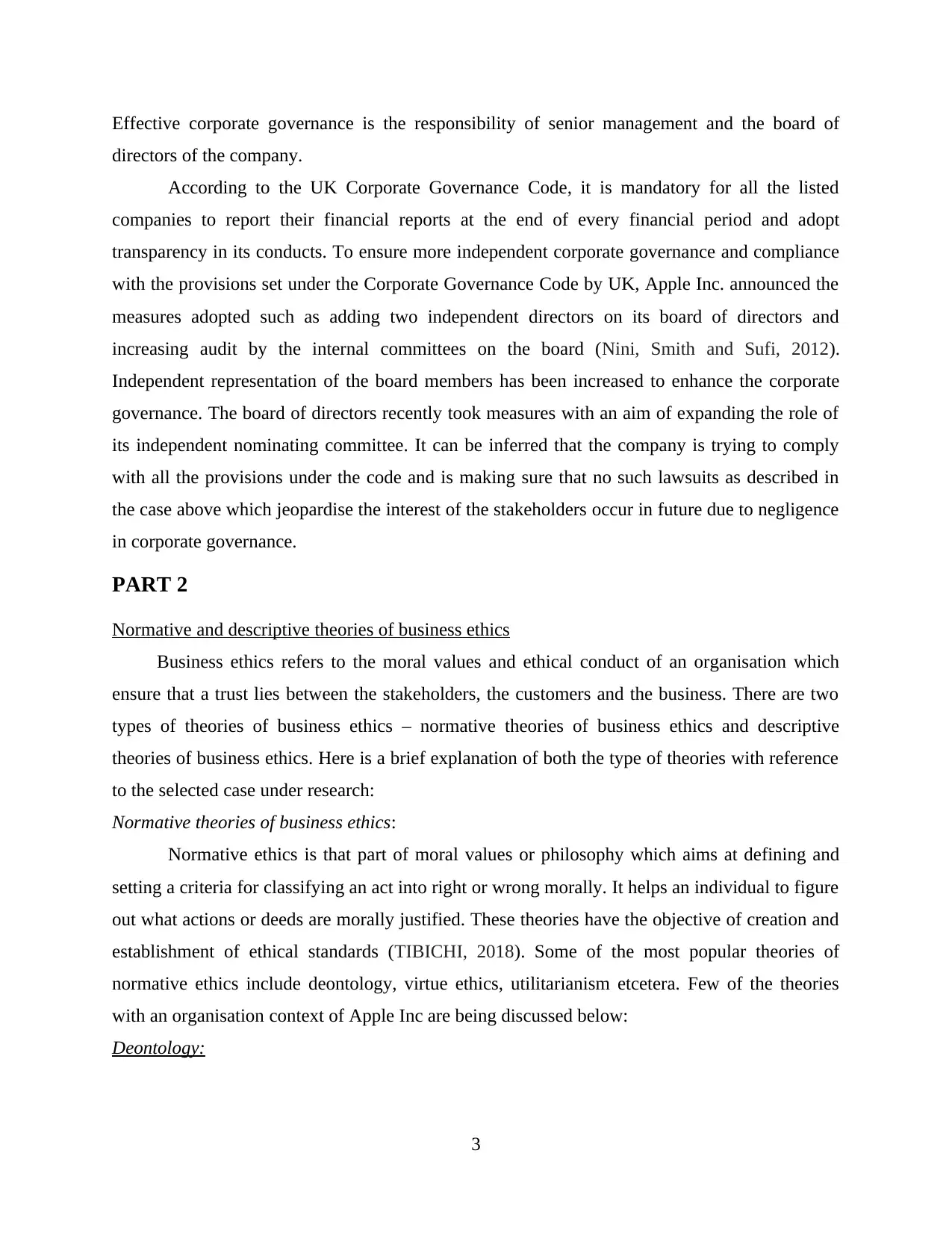
Effective corporate governance is the responsibility of senior management and the board of
directors of the company.
According to the UK Corporate Governance Code, it is mandatory for all the listed
companies to report their financial reports at the end of every financial period and adopt
transparency in its conducts. To ensure more independent corporate governance and compliance
with the provisions set under the Corporate Governance Code by UK, Apple Inc. announced the
measures adopted such as adding two independent directors on its board of directors and
increasing audit by the internal committees on the board (Nini, Smith and Sufi, 2012).
Independent representation of the board members has been increased to enhance the corporate
governance. The board of directors recently took measures with an aim of expanding the role of
its independent nominating committee. It can be inferred that the company is trying to comply
with all the provisions under the code and is making sure that no such lawsuits as described in
the case above which jeopardise the interest of the stakeholders occur in future due to negligence
in corporate governance.
PART 2
Normative and descriptive theories of business ethics
Business ethics refers to the moral values and ethical conduct of an organisation which
ensure that a trust lies between the stakeholders, the customers and the business. There are two
types of theories of business ethics – normative theories of business ethics and descriptive
theories of business ethics. Here is a brief explanation of both the type of theories with reference
to the selected case under research:
Normative theories of business ethics:
Normative ethics is that part of moral values or philosophy which aims at defining and
setting a criteria for classifying an act into right or wrong morally. It helps an individual to figure
out what actions or deeds are morally justified. These theories have the objective of creation and
establishment of ethical standards (TIBICHI, 2018). Some of the most popular theories of
normative ethics include deontology, virtue ethics, utilitarianism etcetera. Few of the theories
with an organisation context of Apple Inc are being discussed below:
Deontology:
3
directors of the company.
According to the UK Corporate Governance Code, it is mandatory for all the listed
companies to report their financial reports at the end of every financial period and adopt
transparency in its conducts. To ensure more independent corporate governance and compliance
with the provisions set under the Corporate Governance Code by UK, Apple Inc. announced the
measures adopted such as adding two independent directors on its board of directors and
increasing audit by the internal committees on the board (Nini, Smith and Sufi, 2012).
Independent representation of the board members has been increased to enhance the corporate
governance. The board of directors recently took measures with an aim of expanding the role of
its independent nominating committee. It can be inferred that the company is trying to comply
with all the provisions under the code and is making sure that no such lawsuits as described in
the case above which jeopardise the interest of the stakeholders occur in future due to negligence
in corporate governance.
PART 2
Normative and descriptive theories of business ethics
Business ethics refers to the moral values and ethical conduct of an organisation which
ensure that a trust lies between the stakeholders, the customers and the business. There are two
types of theories of business ethics – normative theories of business ethics and descriptive
theories of business ethics. Here is a brief explanation of both the type of theories with reference
to the selected case under research:
Normative theories of business ethics:
Normative ethics is that part of moral values or philosophy which aims at defining and
setting a criteria for classifying an act into right or wrong morally. It helps an individual to figure
out what actions or deeds are morally justified. These theories have the objective of creation and
establishment of ethical standards (TIBICHI, 2018). Some of the most popular theories of
normative ethics include deontology, virtue ethics, utilitarianism etcetera. Few of the theories
with an organisation context of Apple Inc are being discussed below:
Deontology:
3
⊘ This is a preview!⊘
Do you want full access?
Subscribe today to unlock all pages.

Trusted by 1+ million students worldwide
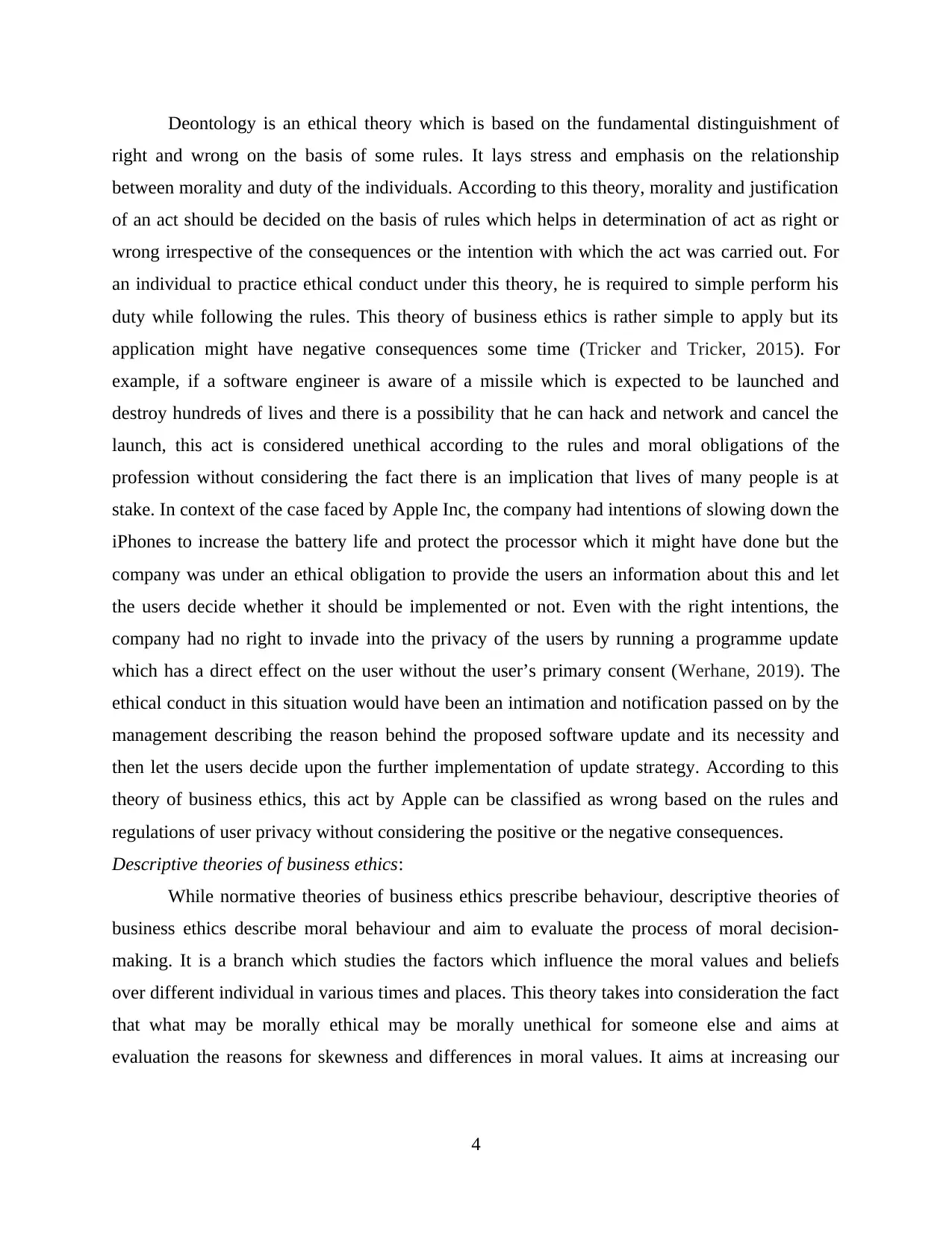
Deontology is an ethical theory which is based on the fundamental distinguishment of
right and wrong on the basis of some rules. It lays stress and emphasis on the relationship
between morality and duty of the individuals. According to this theory, morality and justification
of an act should be decided on the basis of rules which helps in determination of act as right or
wrong irrespective of the consequences or the intention with which the act was carried out. For
an individual to practice ethical conduct under this theory, he is required to simple perform his
duty while following the rules. This theory of business ethics is rather simple to apply but its
application might have negative consequences some time (Tricker and Tricker, 2015). For
example, if a software engineer is aware of a missile which is expected to be launched and
destroy hundreds of lives and there is a possibility that he can hack and network and cancel the
launch, this act is considered unethical according to the rules and moral obligations of the
profession without considering the fact there is an implication that lives of many people is at
stake. In context of the case faced by Apple Inc, the company had intentions of slowing down the
iPhones to increase the battery life and protect the processor which it might have done but the
company was under an ethical obligation to provide the users an information about this and let
the users decide whether it should be implemented or not. Even with the right intentions, the
company had no right to invade into the privacy of the users by running a programme update
which has a direct effect on the user without the user’s primary consent (Werhane, 2019). The
ethical conduct in this situation would have been an intimation and notification passed on by the
management describing the reason behind the proposed software update and its necessity and
then let the users decide upon the further implementation of update strategy. According to this
theory of business ethics, this act by Apple can be classified as wrong based on the rules and
regulations of user privacy without considering the positive or the negative consequences.
Descriptive theories of business ethics:
While normative theories of business ethics prescribe behaviour, descriptive theories of
business ethics describe moral behaviour and aim to evaluate the process of moral decision-
making. It is a branch which studies the factors which influence the moral values and beliefs
over different individual in various times and places. This theory takes into consideration the fact
that what may be morally ethical may be morally unethical for someone else and aims at
evaluation the reasons for skewness and differences in moral values. It aims at increasing our
4
right and wrong on the basis of some rules. It lays stress and emphasis on the relationship
between morality and duty of the individuals. According to this theory, morality and justification
of an act should be decided on the basis of rules which helps in determination of act as right or
wrong irrespective of the consequences or the intention with which the act was carried out. For
an individual to practice ethical conduct under this theory, he is required to simple perform his
duty while following the rules. This theory of business ethics is rather simple to apply but its
application might have negative consequences some time (Tricker and Tricker, 2015). For
example, if a software engineer is aware of a missile which is expected to be launched and
destroy hundreds of lives and there is a possibility that he can hack and network and cancel the
launch, this act is considered unethical according to the rules and moral obligations of the
profession without considering the fact there is an implication that lives of many people is at
stake. In context of the case faced by Apple Inc, the company had intentions of slowing down the
iPhones to increase the battery life and protect the processor which it might have done but the
company was under an ethical obligation to provide the users an information about this and let
the users decide whether it should be implemented or not. Even with the right intentions, the
company had no right to invade into the privacy of the users by running a programme update
which has a direct effect on the user without the user’s primary consent (Werhane, 2019). The
ethical conduct in this situation would have been an intimation and notification passed on by the
management describing the reason behind the proposed software update and its necessity and
then let the users decide upon the further implementation of update strategy. According to this
theory of business ethics, this act by Apple can be classified as wrong based on the rules and
regulations of user privacy without considering the positive or the negative consequences.
Descriptive theories of business ethics:
While normative theories of business ethics prescribe behaviour, descriptive theories of
business ethics describe moral behaviour and aim to evaluate the process of moral decision-
making. It is a branch which studies the factors which influence the moral values and beliefs
over different individual in various times and places. This theory takes into consideration the fact
that what may be morally ethical may be morally unethical for someone else and aims at
evaluation the reasons for skewness and differences in moral values. It aims at increasing our
4
Paraphrase This Document
Need a fresh take? Get an instant paraphrase of this document with our AI Paraphraser
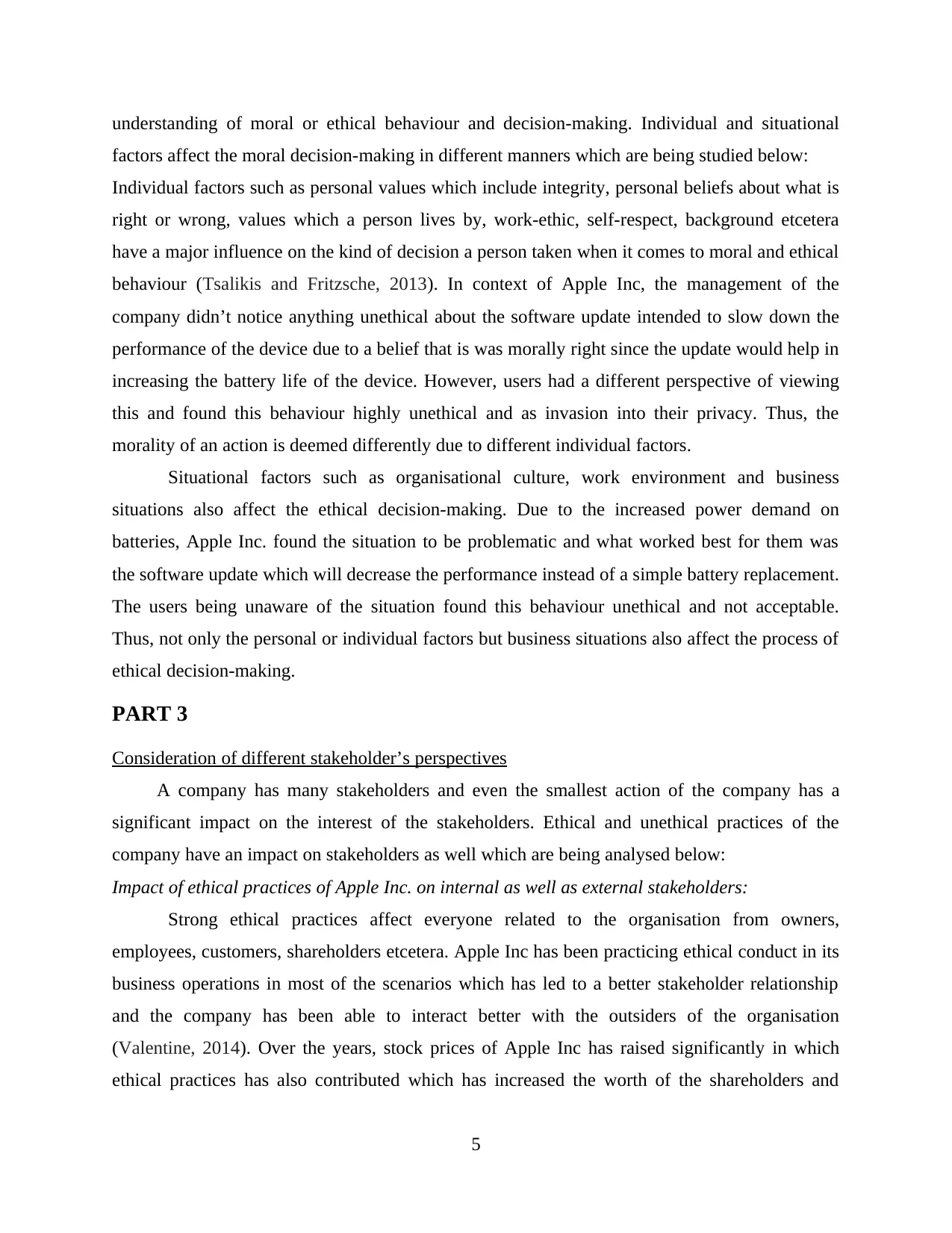
understanding of moral or ethical behaviour and decision-making. Individual and situational
factors affect the moral decision-making in different manners which are being studied below:
Individual factors such as personal values which include integrity, personal beliefs about what is
right or wrong, values which a person lives by, work-ethic, self-respect, background etcetera
have a major influence on the kind of decision a person taken when it comes to moral and ethical
behaviour (Tsalikis and Fritzsche, 2013). In context of Apple Inc, the management of the
company didn’t notice anything unethical about the software update intended to slow down the
performance of the device due to a belief that is was morally right since the update would help in
increasing the battery life of the device. However, users had a different perspective of viewing
this and found this behaviour highly unethical and as invasion into their privacy. Thus, the
morality of an action is deemed differently due to different individual factors.
Situational factors such as organisational culture, work environment and business
situations also affect the ethical decision-making. Due to the increased power demand on
batteries, Apple Inc. found the situation to be problematic and what worked best for them was
the software update which will decrease the performance instead of a simple battery replacement.
The users being unaware of the situation found this behaviour unethical and not acceptable.
Thus, not only the personal or individual factors but business situations also affect the process of
ethical decision-making.
PART 3
Consideration of different stakeholder’s perspectives
A company has many stakeholders and even the smallest action of the company has a
significant impact on the interest of the stakeholders. Ethical and unethical practices of the
company have an impact on stakeholders as well which are being analysed below:
Impact of ethical practices of Apple Inc. on internal as well as external stakeholders:
Strong ethical practices affect everyone related to the organisation from owners,
employees, customers, shareholders etcetera. Apple Inc has been practicing ethical conduct in its
business operations in most of the scenarios which has led to a better stakeholder relationship
and the company has been able to interact better with the outsiders of the organisation
(Valentine, 2014). Over the years, stock prices of Apple Inc has raised significantly in which
ethical practices has also contributed which has increased the worth of the shareholders and
5
factors affect the moral decision-making in different manners which are being studied below:
Individual factors such as personal values which include integrity, personal beliefs about what is
right or wrong, values which a person lives by, work-ethic, self-respect, background etcetera
have a major influence on the kind of decision a person taken when it comes to moral and ethical
behaviour (Tsalikis and Fritzsche, 2013). In context of Apple Inc, the management of the
company didn’t notice anything unethical about the software update intended to slow down the
performance of the device due to a belief that is was morally right since the update would help in
increasing the battery life of the device. However, users had a different perspective of viewing
this and found this behaviour highly unethical and as invasion into their privacy. Thus, the
morality of an action is deemed differently due to different individual factors.
Situational factors such as organisational culture, work environment and business
situations also affect the ethical decision-making. Due to the increased power demand on
batteries, Apple Inc. found the situation to be problematic and what worked best for them was
the software update which will decrease the performance instead of a simple battery replacement.
The users being unaware of the situation found this behaviour unethical and not acceptable.
Thus, not only the personal or individual factors but business situations also affect the process of
ethical decision-making.
PART 3
Consideration of different stakeholder’s perspectives
A company has many stakeholders and even the smallest action of the company has a
significant impact on the interest of the stakeholders. Ethical and unethical practices of the
company have an impact on stakeholders as well which are being analysed below:
Impact of ethical practices of Apple Inc. on internal as well as external stakeholders:
Strong ethical practices affect everyone related to the organisation from owners,
employees, customers, shareholders etcetera. Apple Inc has been practicing ethical conduct in its
business operations in most of the scenarios which has led to a better stakeholder relationship
and the company has been able to interact better with the outsiders of the organisation
(Valentine, 2014). Over the years, stock prices of Apple Inc has raised significantly in which
ethical practices has also contributed which has increased the worth of the shareholders and
5
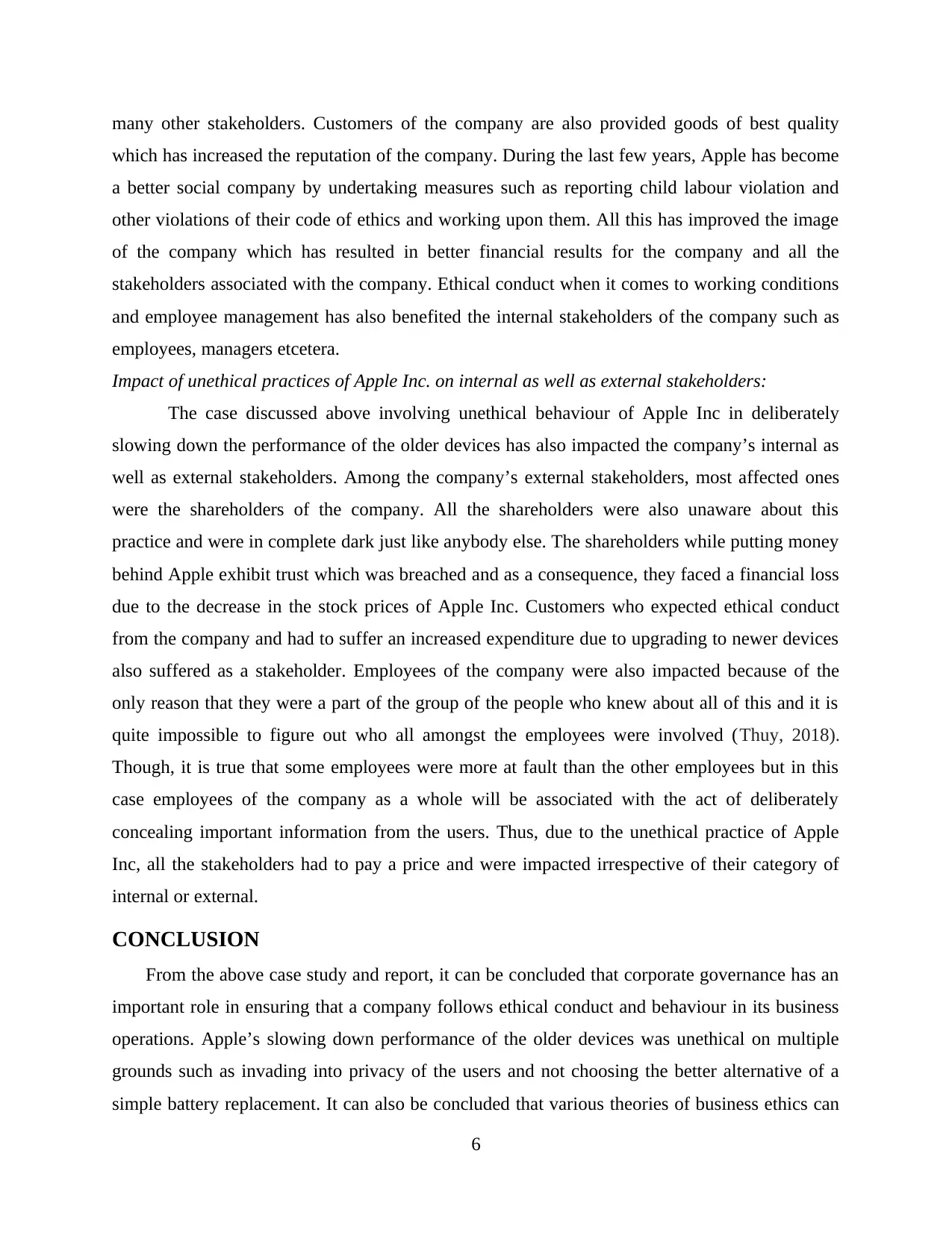
many other stakeholders. Customers of the company are also provided goods of best quality
which has increased the reputation of the company. During the last few years, Apple has become
a better social company by undertaking measures such as reporting child labour violation and
other violations of their code of ethics and working upon them. All this has improved the image
of the company which has resulted in better financial results for the company and all the
stakeholders associated with the company. Ethical conduct when it comes to working conditions
and employee management has also benefited the internal stakeholders of the company such as
employees, managers etcetera.
Impact of unethical practices of Apple Inc. on internal as well as external stakeholders:
The case discussed above involving unethical behaviour of Apple Inc in deliberately
slowing down the performance of the older devices has also impacted the company’s internal as
well as external stakeholders. Among the company’s external stakeholders, most affected ones
were the shareholders of the company. All the shareholders were also unaware about this
practice and were in complete dark just like anybody else. The shareholders while putting money
behind Apple exhibit trust which was breached and as a consequence, they faced a financial loss
due to the decrease in the stock prices of Apple Inc. Customers who expected ethical conduct
from the company and had to suffer an increased expenditure due to upgrading to newer devices
also suffered as a stakeholder. Employees of the company were also impacted because of the
only reason that they were a part of the group of the people who knew about all of this and it is
quite impossible to figure out who all amongst the employees were involved (Thuy, 2018).
Though, it is true that some employees were more at fault than the other employees but in this
case employees of the company as a whole will be associated with the act of deliberately
concealing important information from the users. Thus, due to the unethical practice of Apple
Inc, all the stakeholders had to pay a price and were impacted irrespective of their category of
internal or external.
CONCLUSION
From the above case study and report, it can be concluded that corporate governance has an
important role in ensuring that a company follows ethical conduct and behaviour in its business
operations. Apple’s slowing down performance of the older devices was unethical on multiple
grounds such as invading into privacy of the users and not choosing the better alternative of a
simple battery replacement. It can also be concluded that various theories of business ethics can
6
which has increased the reputation of the company. During the last few years, Apple has become
a better social company by undertaking measures such as reporting child labour violation and
other violations of their code of ethics and working upon them. All this has improved the image
of the company which has resulted in better financial results for the company and all the
stakeholders associated with the company. Ethical conduct when it comes to working conditions
and employee management has also benefited the internal stakeholders of the company such as
employees, managers etcetera.
Impact of unethical practices of Apple Inc. on internal as well as external stakeholders:
The case discussed above involving unethical behaviour of Apple Inc in deliberately
slowing down the performance of the older devices has also impacted the company’s internal as
well as external stakeholders. Among the company’s external stakeholders, most affected ones
were the shareholders of the company. All the shareholders were also unaware about this
practice and were in complete dark just like anybody else. The shareholders while putting money
behind Apple exhibit trust which was breached and as a consequence, they faced a financial loss
due to the decrease in the stock prices of Apple Inc. Customers who expected ethical conduct
from the company and had to suffer an increased expenditure due to upgrading to newer devices
also suffered as a stakeholder. Employees of the company were also impacted because of the
only reason that they were a part of the group of the people who knew about all of this and it is
quite impossible to figure out who all amongst the employees were involved (Thuy, 2018).
Though, it is true that some employees were more at fault than the other employees but in this
case employees of the company as a whole will be associated with the act of deliberately
concealing important information from the users. Thus, due to the unethical practice of Apple
Inc, all the stakeholders had to pay a price and were impacted irrespective of their category of
internal or external.
CONCLUSION
From the above case study and report, it can be concluded that corporate governance has an
important role in ensuring that a company follows ethical conduct and behaviour in its business
operations. Apple’s slowing down performance of the older devices was unethical on multiple
grounds such as invading into privacy of the users and not choosing the better alternative of a
simple battery replacement. It can also be concluded that various theories of business ethics can
6
⊘ This is a preview!⊘
Do you want full access?
Subscribe today to unlock all pages.

Trusted by 1+ million students worldwide
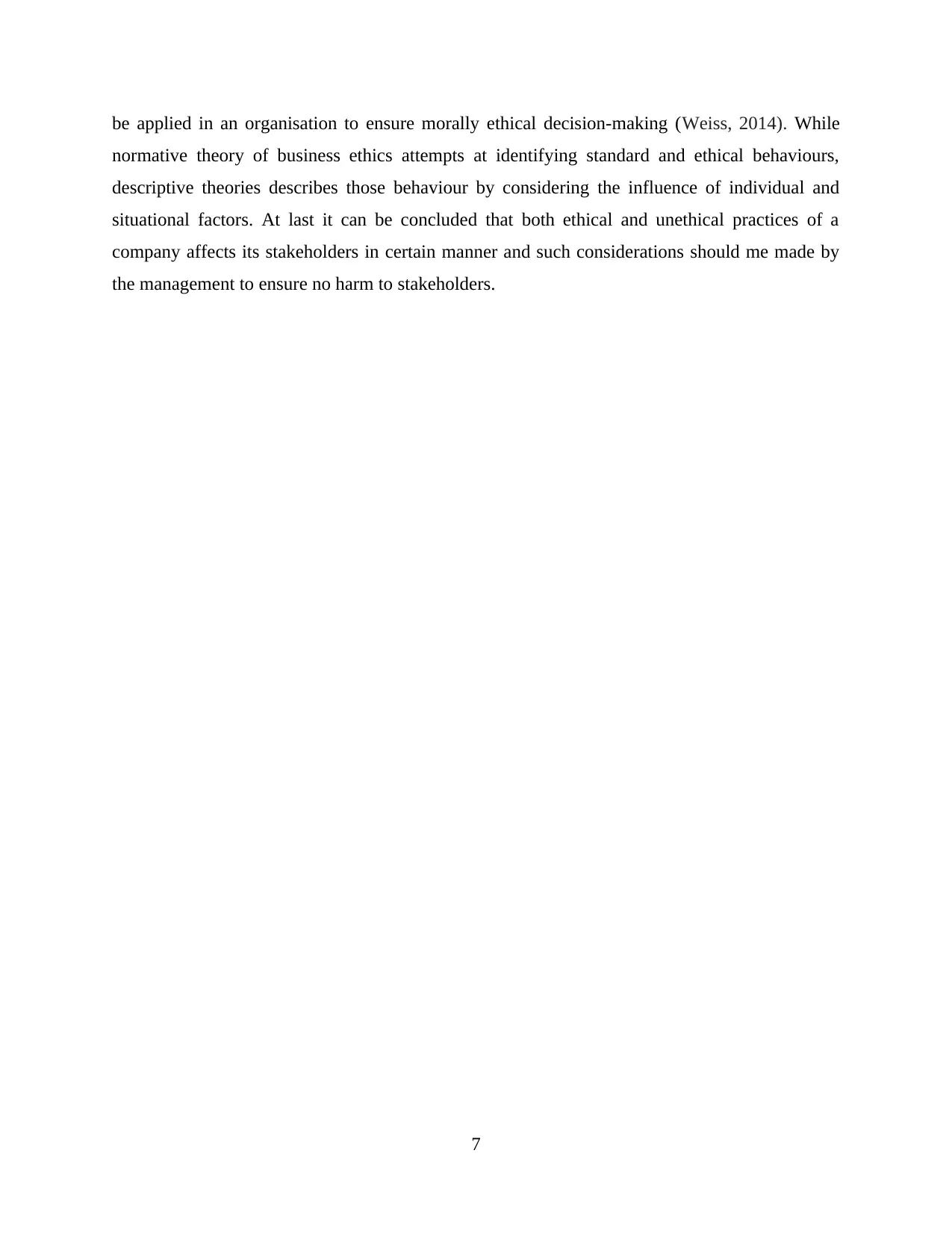
be applied in an organisation to ensure morally ethical decision-making (Weiss, 2014). While
normative theory of business ethics attempts at identifying standard and ethical behaviours,
descriptive theories describes those behaviour by considering the influence of individual and
situational factors. At last it can be concluded that both ethical and unethical practices of a
company affects its stakeholders in certain manner and such considerations should me made by
the management to ensure no harm to stakeholders.
7
normative theory of business ethics attempts at identifying standard and ethical behaviours,
descriptive theories describes those behaviour by considering the influence of individual and
situational factors. At last it can be concluded that both ethical and unethical practices of a
company affects its stakeholders in certain manner and such considerations should me made by
the management to ensure no harm to stakeholders.
7
Paraphrase This Document
Need a fresh take? Get an instant paraphrase of this document with our AI Paraphraser
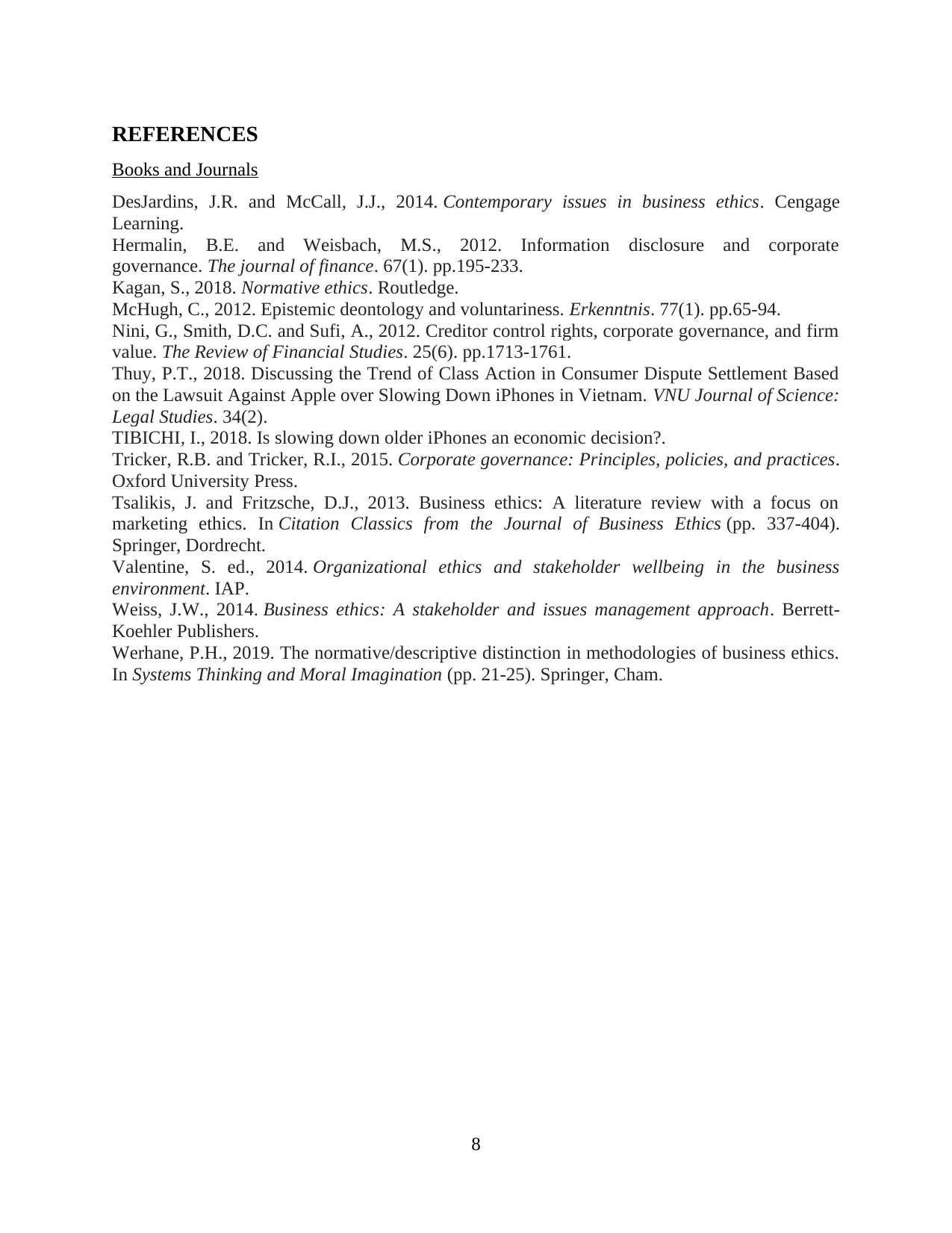
REFERENCES
Books and Journals
DesJardins, J.R. and McCall, J.J., 2014. Contemporary issues in business ethics. Cengage
Learning.
Hermalin, B.E. and Weisbach, M.S., 2012. Information disclosure and corporate
governance. The journal of finance. 67(1). pp.195-233.
Kagan, S., 2018. Normative ethics. Routledge.
McHugh, C., 2012. Epistemic deontology and voluntariness. Erkenntnis. 77(1). pp.65-94.
Nini, G., Smith, D.C. and Sufi, A., 2012. Creditor control rights, corporate governance, and firm
value. The Review of Financial Studies. 25(6). pp.1713-1761.
Thuy, P.T., 2018. Discussing the Trend of Class Action in Consumer Dispute Settlement Based
on the Lawsuit Against Apple over Slowing Down iPhones in Vietnam. VNU Journal of Science:
Legal Studies. 34(2).
TIBICHI, I., 2018. Is slowing down older iPhones an economic decision?.
Tricker, R.B. and Tricker, R.I., 2015. Corporate governance: Principles, policies, and practices.
Oxford University Press.
Tsalikis, J. and Fritzsche, D.J., 2013. Business ethics: A literature review with a focus on
marketing ethics. In Citation Classics from the Journal of Business Ethics (pp. 337-404).
Springer, Dordrecht.
Valentine, S. ed., 2014. Organizational ethics and stakeholder wellbeing in the business
environment. IAP.
Weiss, J.W., 2014. Business ethics: A stakeholder and issues management approach. Berrett-
Koehler Publishers.
Werhane, P.H., 2019. The normative/descriptive distinction in methodologies of business ethics.
In Systems Thinking and Moral Imagination (pp. 21-25). Springer, Cham.
8
Books and Journals
DesJardins, J.R. and McCall, J.J., 2014. Contemporary issues in business ethics. Cengage
Learning.
Hermalin, B.E. and Weisbach, M.S., 2012. Information disclosure and corporate
governance. The journal of finance. 67(1). pp.195-233.
Kagan, S., 2018. Normative ethics. Routledge.
McHugh, C., 2012. Epistemic deontology and voluntariness. Erkenntnis. 77(1). pp.65-94.
Nini, G., Smith, D.C. and Sufi, A., 2012. Creditor control rights, corporate governance, and firm
value. The Review of Financial Studies. 25(6). pp.1713-1761.
Thuy, P.T., 2018. Discussing the Trend of Class Action in Consumer Dispute Settlement Based
on the Lawsuit Against Apple over Slowing Down iPhones in Vietnam. VNU Journal of Science:
Legal Studies. 34(2).
TIBICHI, I., 2018. Is slowing down older iPhones an economic decision?.
Tricker, R.B. and Tricker, R.I., 2015. Corporate governance: Principles, policies, and practices.
Oxford University Press.
Tsalikis, J. and Fritzsche, D.J., 2013. Business ethics: A literature review with a focus on
marketing ethics. In Citation Classics from the Journal of Business Ethics (pp. 337-404).
Springer, Dordrecht.
Valentine, S. ed., 2014. Organizational ethics and stakeholder wellbeing in the business
environment. IAP.
Weiss, J.W., 2014. Business ethics: A stakeholder and issues management approach. Berrett-
Koehler Publishers.
Werhane, P.H., 2019. The normative/descriptive distinction in methodologies of business ethics.
In Systems Thinking and Moral Imagination (pp. 21-25). Springer, Cham.
8
1 out of 11
Related Documents
Your All-in-One AI-Powered Toolkit for Academic Success.
+13062052269
info@desklib.com
Available 24*7 on WhatsApp / Email
![[object Object]](/_next/static/media/star-bottom.7253800d.svg)
Unlock your academic potential
Copyright © 2020–2026 A2Z Services. All Rights Reserved. Developed and managed by ZUCOL.





